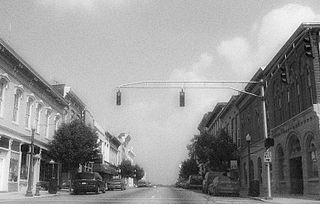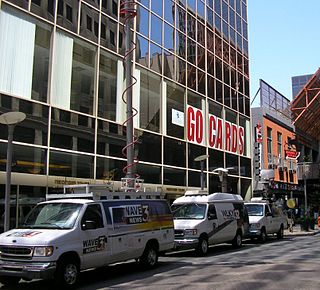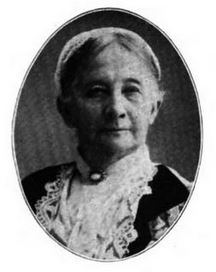
Shelbyville is a home rule-class city in and the county seat of Shelby County, Kentucky, United States. The population was 14,045 at the 2010 census.

Martha Layne Collins is an American former businesswoman and politician from the Commonwealth of Kentucky; she was elected as the state's 56th governor from 1983 to 1987, the first woman to hold the office and the only one to date. Prior to that, she served as the 48th Lieutenant Governor of Kentucky, under John Y. Brown, Jr. Her election made her the highest-ranking Democratic woman in the U.S. She was considered as a possible running mate for Democratic presidential nominee Walter Mondale in the 1984 presidential election, but Mondale chose Congresswoman Geraldine Ferraro instead.

The Kentucky General Assembly, also called the Kentucky Legislature, is the state legislature of the U.S. state of Kentucky. It comprises the Kentucky Senate and the Kentucky House of Representatives.

The General Federation of Women's Clubs (GFWC), founded in 1890 during the Progressive Movement, is a federation of over 3,000 women's clubs in the United States which promote civic improvements through volunteer service. Many of its activities and service projects are done independently by local clubs through their communities or GFWC's national partnerships. GFWC maintains nearly 70,000 members throughout the United States and internationally. GFWC remains one of the world's largest and oldest nonpartisan, nondenominational, women's volunteer service organizations. The GFWC headquarters is located in Washington, D.C.

This is a list of media publications and sources in Louisville, Kentucky.

Madeline (Madge) McDowell Breckinridge was an American leader of the women's suffrage movement in Kentucky. She married Desha Breckinridge, editor of the Lexington Herald, which advocated women's rights, and she lived to see the women of Kentucky vote for the first time in the presidential election of 1920. She also initiated progressive reforms for compulsory school attendance and child labor. She founded many civic organizations, notably the Kentucky Association for the Prevention and Treatment of Tuberculosis, an affliction from which she had personally suffered. She led efforts to implement model schools for children and adults, parks and recreation facilities, and manual training programs.
James Fontleroy Grinstead was a businessman, mayor of Louisville, Kentucky from 1907 to 1909, and county commissioner from 1917 to his death in 1921. He is a descendant of William & Elizabeth Key Grinstead
David Walls is an activist and academic who has made significant contributions to Appalachian studies and to the popular understanding of social movements. He is professor emeritus of sociology at Sonoma State University (SSU) in California, where he was dean of extended education from 1984 to 2000.
The Jeffersonian was a weekly newspaper published on Thursdays, in Jeffersontown, Jefferson County, Kentucky. The Jeffersonian was first published on June 13, 1907, and was last published in 1965.

Patty Prather Thum was an American artist from Louisville, Kentucky known for her landscapes, paintings of roses, and book illustrations. She studied art at Vassar College and the Art Students League of New York and maintained a portrait and landscape studio in Louisville for 35 years. She taught art, illustrated books and magazines, was an inventor, served as the president of the Louisville Art League, member of the Louisville Women's Club, and was the art critic for the Louisville Herald until 1925.
NAACP in Kentucky is very active with branches all over the state, largest being in Louisville and Lexington. The Kentucky State Conference of NAACP continues today to fight against injustices and for the equality of all people.

Kentucky Equal Rights Association (KERA) was the first permanent statewide women's rights organization in Kentucky. Founded in November 1888, the KERA voted in 1920 to transmute itself into the Kentucky League of Women Voters to continue its many and diverse progressive efforts on behalf of women's rights.

Mary Virginia Cook Parrish was an early proponent of Black Baptist feminism, working to gain equality and social justice for all. After being given the opportunity to further her education, Cook-Parrish taught, wrote and spoke on many issues such as women's suffrage, equal rights in the areas of employment and education, social and political reform, and the importance of religion and a Christian education. She was at the founding session of the National Association of Colored Women in 1896 at the 19th Street Baptist Church in Washington D.C. and was a founder of the National Baptist Women's Convention in 1900.

The woman's club movement was a social movement that took place throughout the United States that established the idea that women had a moral duty and responsibility to transform public policy. While women's organizations had always been a part of United States history, it was not until the Progressive era that it came to be considered a "movement." The first wave of the club movement during the Progressive era was started by white, middle-class, Protestant women and a second phase by African-American women.

Our Women and Children was a magazine published in Louisville, Kentucky by the American Baptist, the state Baptist newspaper. Founded in 1888 by William J. Simmons, president of State University, the magazine featured the work of African-American women journalists and covered both juvenile literature and articles focusing on uplifting the race. The magazine staff was made up of women who had an affiliation with State University. Of the hundreds of magazines begun in the United States between 1890 and 1950, very few gave editorial control or ownership to African American Women. Our Women and Children was one of them. It had a national reputation and became the leading black magazine in Kentucky before it folded in 1891 after Simmons' death.
The Woman's Era Club was an African-American women's civic organization founded in Boston, Massachusetts, in between 1892 and 1894 by Josephine St. Pierre Ruffin. The Club was the first black women's club in Boston. The organization was especially well-known for the conflict caused when Ruffin attempted to desegregate the General Federation of Women's Clubs (GFWC) in 1900.

Susan Look Avery was an American writer, suffragist, pacifist and supporter of temperance as well as a single tax. She hosted Lucy Stone and husband Henry Blackwell when they came to Louisville, Kentucky for the American Woman Suffrage Association meeting—the first suffrage convention in the South—in 1881. In 1890 she started the Woman's Club of Louisville, and in honor of her birthday, the suffrage club of Wyoming, New York, named itself after her.
The Federation of Women's Clubs for Oklahoma and Indian Territories was formed in May, 1898. The motto selected for the organization was "Kindliness and Helpfulness". The first president was Sophia Julia Coleman Douglas.
May Stone was an American educator and administrator from Kentucky who contributed to the settlement school movement of the early 20th century.

Mary Creegan Roark was the first female President and second ever President of Eastern Kentucky State Normal School, later becoming Eastern Kentucky University, from April 1909 until March 1910. Roark held this position following the death of her husband, Ruric Nevel Roark, in 1909. Roark led the university at a time when women did not have the right to vote in state or federal elections. Roark was involved in the Suffrage Movement for Equal Rights and was elected Secretary of the Kentucky Equal Rights Association in 1898. Her stances included better teacher training and salaries, she also helped gain the right to vote in school elections. Roark died in Baltimore, Maryland on February 1, 1922 and is buried in Richmond, Kentucky at the Richmond Cemetery.













